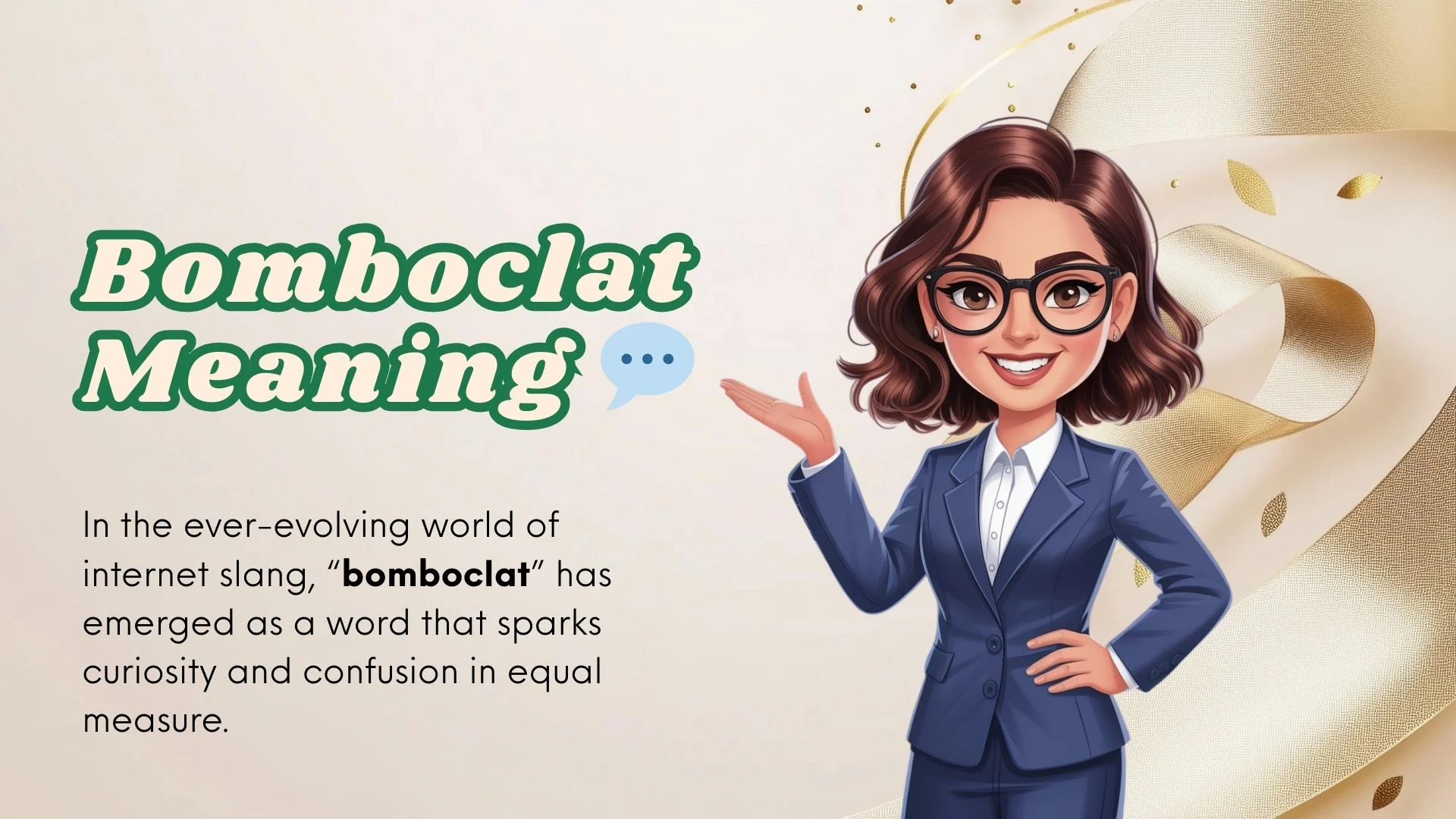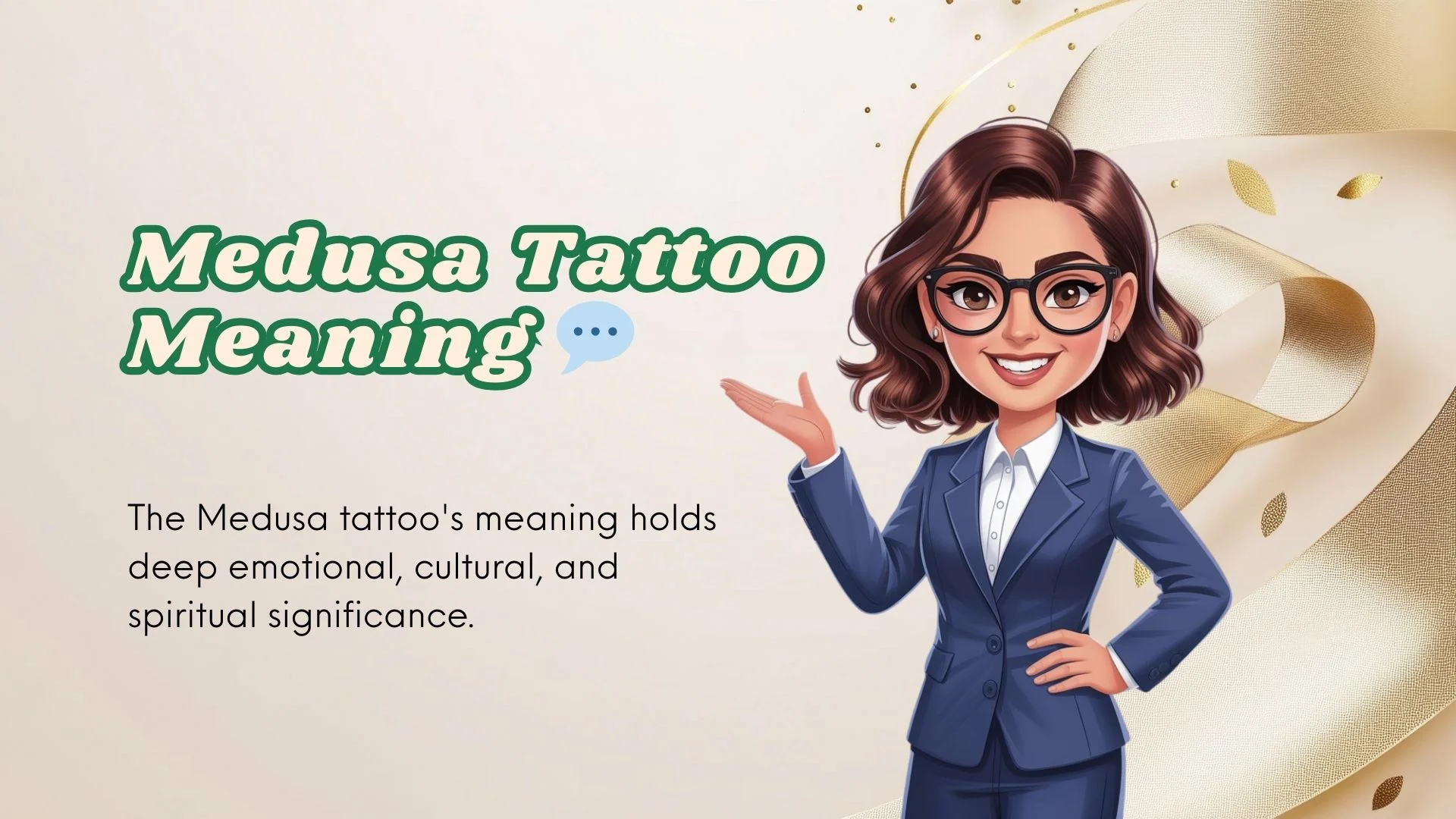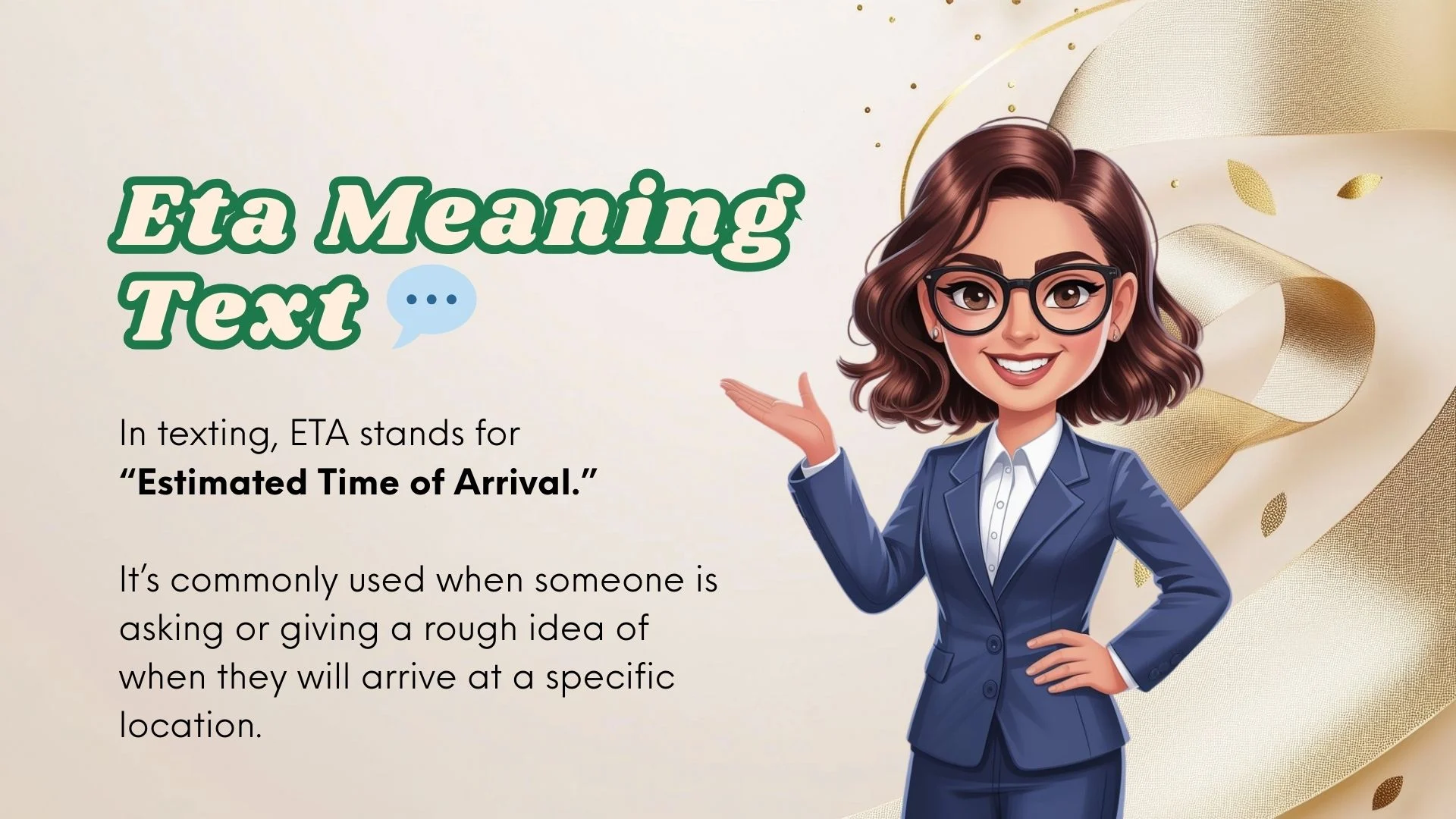In the ever-evolving world of internet slang, “bomboclat” has emerged as a word that sparks curiosity and confusion in equal measure.
Whether you’ve seen it plastered across memes, used in humorous comments, or shouted dramatically in videos, this term has taken over platforms like Twitter, TikTok, and WhatsApp.
But what does it mean?
Why are people using it in such diverse ways?
Originally rooted in Caribbean dialects, this term has traveled far beyond its original cultural context to become a powerful expression online.
While some use it jokingly, others may find its origin more intense or offensive.
That’s why so many users search for the true bomboclat meaning—to understand not just what it is, but how and when to use it (or avoid it).
This article breaks down everything you need to know—from its roots and real-world meanings to how it’s used in everyday digital conversations.
Meaning & Definition
At its core, bomboclat is a Jamaican Patois term often used to express intense emotion, typically anger, shock, or frustration.
It’s a profanity, much like curse words in English, and carries strong emotional weight in its original context.
- Literal Origin: The word combines bumbo (referring to one’s rear end or private parts) and claat (meaning cloth, like a sanitary cloth). Put together, it becomes a vulgar insult or exclamation.
- Current Slang Usage: On the internet, especially outside Jamaica, the term has morphed into a humorous or expressive tool.
- People often post a captionless image with “bomboclat,” inviting others to provide a funny or dramatic caption.
Tone: The tone varies by context. While it may sound intense or inappropriate to a Jamaican speaker, in digital culture, it’s often used playfully.
Understanding its original meaning helps ensure it’s not misused or misinterpreted in conversations.
Bomboclat Meaning in English
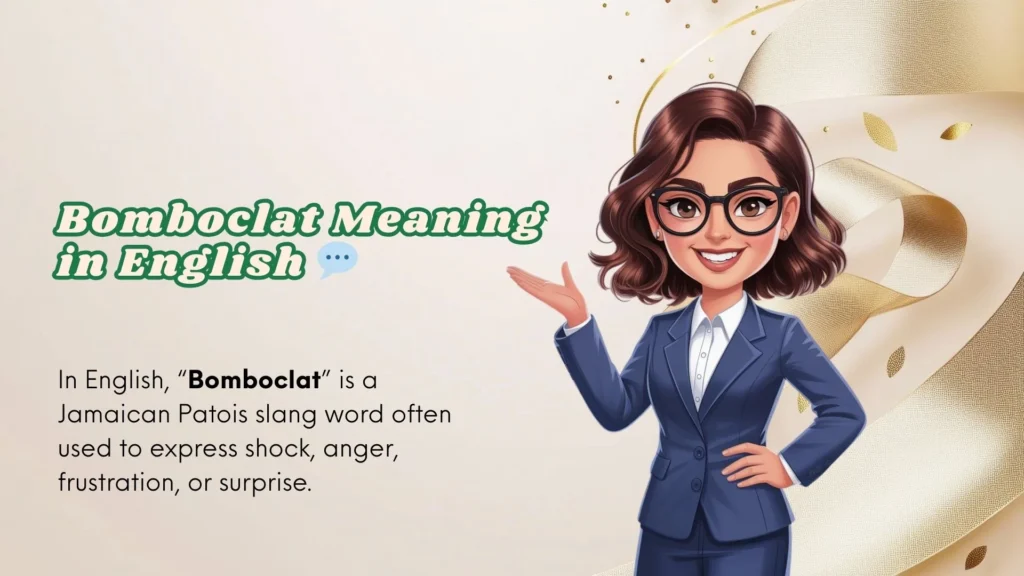
In English, “Bomboclat” is a Jamaican Patois slang word often used to express shock, anger, frustration, or surprise.
It’s considered a vulgar or offensive term and doesn’t have a direct English equivalent, but it’s similar in tone to curse words or emotional outbursts like “What the hell?” or “WTF!”
Over time, the term has taken on a more versatile meme usage online, especially on platforms like Twitter, where it can be humorous or expressive without its original offensive weight.
Bomboclat Meaning in Jamaican Language
In Jamaican Patois, “Bomboclat” (also spelled “Bumboclaat”) is a profanity with deep cultural context.
Literally, it refers to a menstrual cloth or toilet paper, which is why it’s considered extremely vulgar and offensive when used seriously.
However, in Jamaica, people often use it to:
- Express strong emotion (anger, disbelief, etc.)
- Emphasize a statement
It functions like an emotional expletive, depending on tone and context.
Bomboclat Meaning Slang
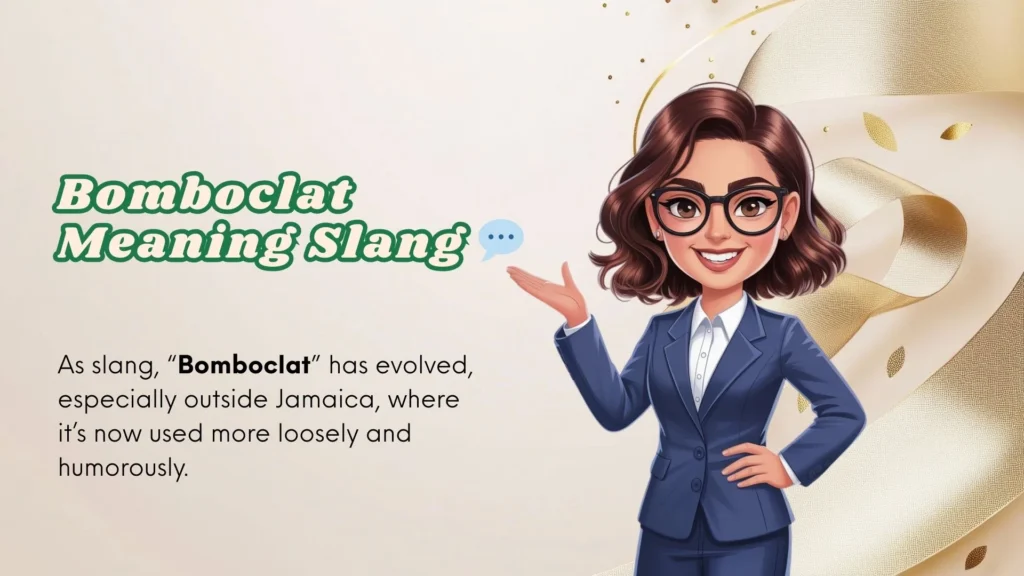
As slang, “Bomboclat” has evolved, especially outside Jamaica, where it’s now used more loosely and humorously.
Among younger audiences or on social media, it has:
- Become part of meme culture
- Been repurposed to caption images or videos with outrageous or relatable reactions
- Lost some of its original shock value in international use
Still, it’s important to note that in Jamaican culture, it remains offensive and should be used with caution and respect.
Bomboclat Meaning Twitter
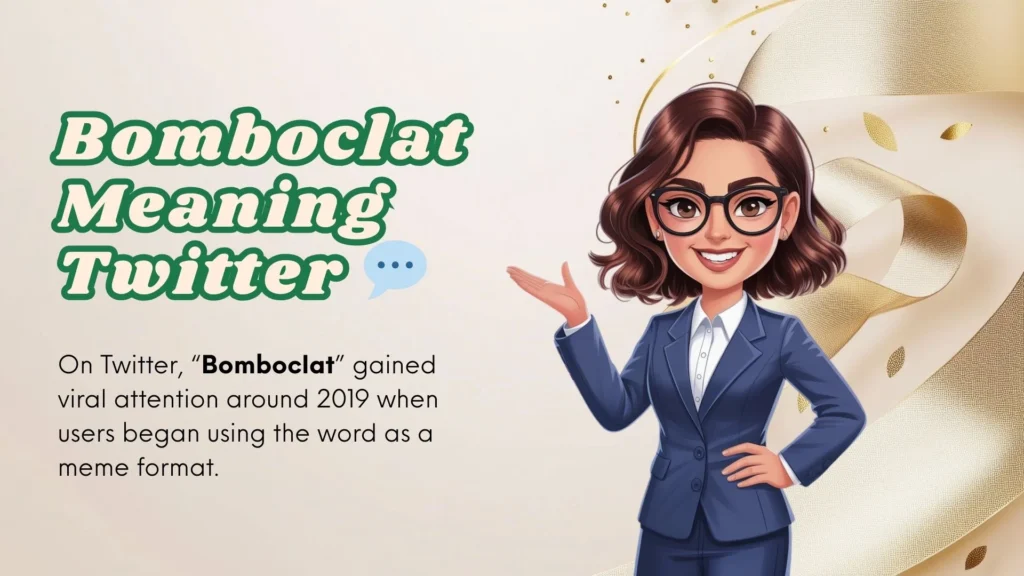
On Twitter, “Bomboclat” gained viral attention around 2019 when users began using the word as a meme format.
Here’s how it works:
- A user posts “Bomboclat” with an image or video.
- Others respond by adding a funny or dramatic caption that matches the emotion or situation in the post.
This trend shifted the world’s tone from a Jamaican expletive to a social media caption game, though the original meaning still holds cultural weight.
For many, it’s now a way to express emotions visually and creatively online.
Jamaican Bomboclat Meaning
In Jamaican culture, “Bomboclat” is one of the strongest curse words or insults.
It’s often used:
- In heated arguments or fights
- To curse someone out
- As an expletive of frustration or anger
Its cultural significance is tied to its roots in colonial history and local expressions, making it more than just a casual slang word.
Jamaicans understand the weight and vulgarity behind it, which is why locals may take offense when it’s used lightly or out of context by non-Jamaicans.
Mi Bomboclat Meaning
The phrase “Mi Bomboclat” is a combination of “Mi” (meaning “my” or “me”) and the Jamaican expletive “Bomboclat.”
In Jamaican Patois, this phrase can express intense emotion, such as:
- Anger: “Mi bomboclat! What did you just say?”
- Shock or surprise: “Mi bomboclat! That’s unbelievable!”
It’s similar to someone saying “My damn!” or “My goodness!” in English, though much stronger and more vulgar in tone.
It’s generally not polite and should be used cautiously.
Bomboclat Meaning Jamaica
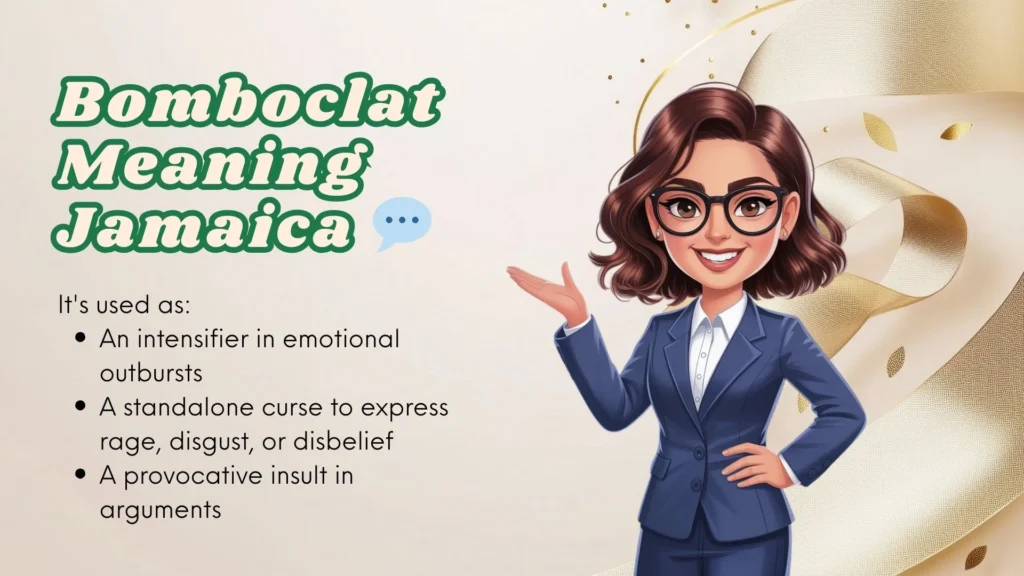
In Jamaica, “Bomboclat” is one of the most offensive swear words in the local dialect. It’s used as:
- An intensifier in emotional outbursts
- A standalone curse to express rage, disgust, or disbelief
- A provocative insult in arguments
Though often heard in music and street talk, it remains highly inappropriate in formal or respectful settings.
Its deep cultural context makes it a sensitive word, and non-Jamaicans should be mindful of its impact.
Rasclat Bomboclat Meaning
“Rasclat” and “Bomboclat” are both Jamaican expletives, similar in origin and meaning.
- “Rasclat” (or “Rassclaat”) also refers to a menstrual cloth or rag, much like “Bomboclat.”
- Both terms are used to curse, insult, or express outrage.
When combined — as in “Rasclat Bomboclat!” — the phrase delivers intense vulgarity, often used in moments of extreme anger, shock, or emphasis.
These words are considered among the harshest swear words in Jamaican Patois.
Bomboclat Meaning Jamaican Patois
In Jamaican Patois, “Bomboclat” (also spelled “Bumboclaat”) is a profane and taboo word.
- It literally refers to a sanitary rag or toilet cloth.
- Figuratively, it’s used as a curse word or verbal attack during intense emotional moments.
Despite its vulgar roots, the word has become widely recognized through dancehall music, Jamaican films, and social media.
Still, within Jamaican culture, it is not taken lightly, and its use carries serious offensive weight.
Bomboclat Meaning Origin Jamaican Slang
The origin of “Bomboclat” lies in Jamaican Creole, a blend of English and West African linguistic influences.
- The term originally referred to cloths used for intimate hygiene, making it taboo and obscene.
- Over time, it evolved into a strong curse word and became part of everyday Jamaican slang, often used to show anger, disgust, surprise, or disrespect.
The word reflects Jamaica’s unique cultural expression, where everyday items gain symbolic emotional power through language.
Despite its rise in online memes, “Bomboclat” remains a word of serious vulgarity in its original context.
Bomboclat Meaning Urban Dictionary
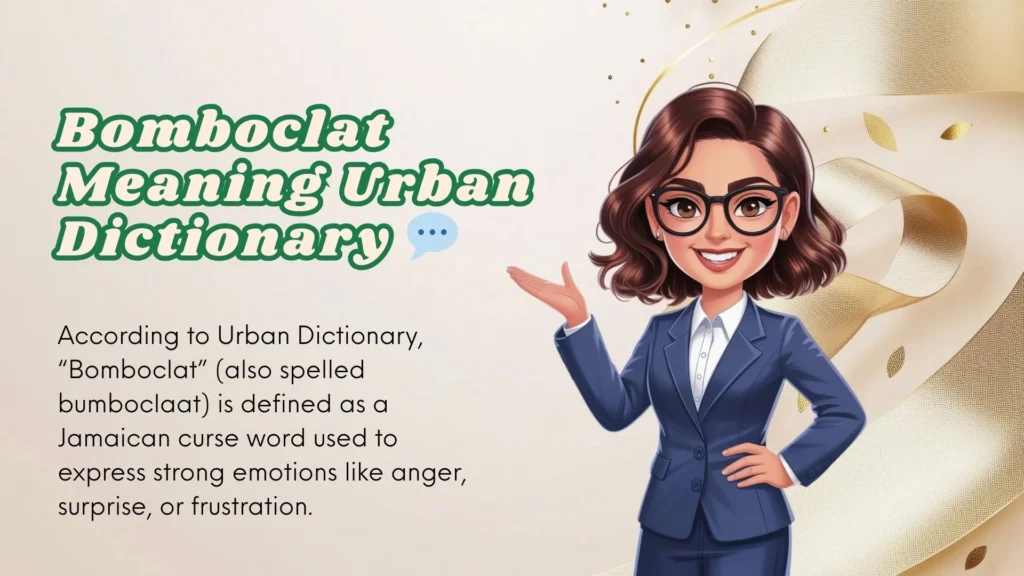
According to Urban Dictionary, “Bomboclat” (also spelled bumboclaat) is defined as a Jamaican curse word used to express strong emotions like anger, surprise, or frustration.
It’s often explained as an intensely vulgar term originally referring to menstrual rags or toilet cloths in Jamaican Patois.
Users on the platform also reference how the word has become popular in memes and reaction captions online, particularly in Black Twitter and meme culture, where its offensive roots are often misunderstood or diluted by non-Jamaican audiences.
Bomboclat Meaning TikTok
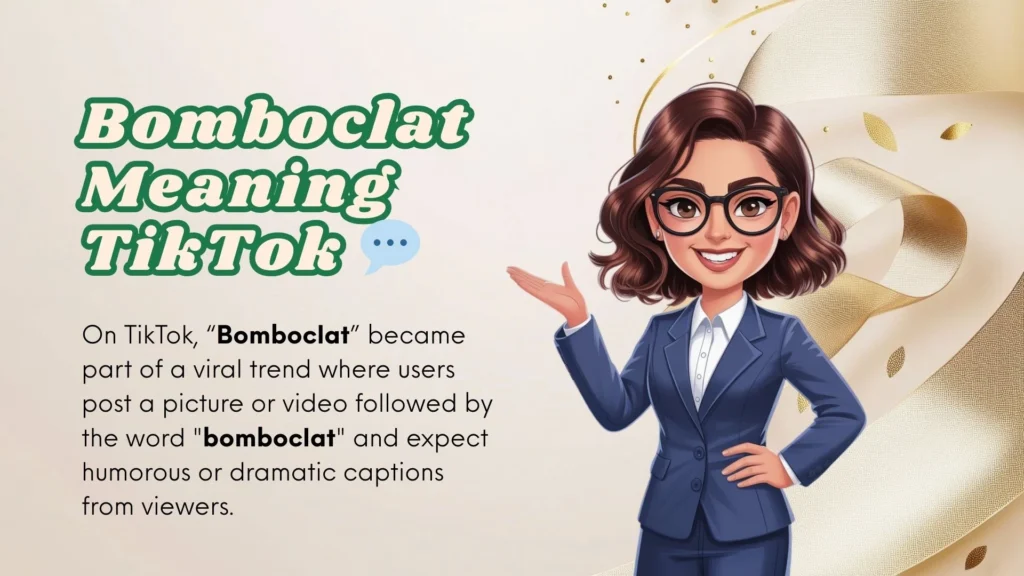
On TikTok, “Bomboclat” became part of a viral trend where users post a picture or video followed by the word “bomboclat” and expect humorous or dramatic captions from viewers.
This meme format resembles:
- “Caption this!”
- “Say something that fits this scene.”
Although the trend brought the word into mainstream meme culture, many users use it without knowing its original Jamaican vulgarity, leading to debates about cultural appropriation and respect for Caribbean language.
Jamaican Bomboclat Meaning in English
In English, the Jamaican word “Bomboclat” roughly translates to an aggressive expletive similar to:
- “Damn it!”
- “WTF!”
- “You’ve got to be kidding me!”
Though it has no exact English equivalent, the emotion it conveys is clear — often shock, rage, or emphasis.
Its literal origin refers to a sanitary rag, but in spoken Jamaican Patois, it’s more commonly used as a verbal outburst or insult.
In English contexts, people may misunderstand its deeply vulgar and offensive tone when used casually.
Bomboclat Meaning Origin Jamaican Slang
The word “Bomboclat” originated in Jamaican Creole (Patois) and is a blend of:
- “Bumbo” (buttocks or bottom)
- “Claat” (cloth or rag)
The phrase originally described sanitary or toilet cloths, making it inherently vulgar.
Over time, Jamaicans began using it as a swear word — a way to express intense emotions or insult someone.
Its use in dancehall music, Jamaican film, and Caribbean communities has made it a core part of Jamaican slang, though still highly offensive in native usage.
Bomboclat Meaning Deutsch
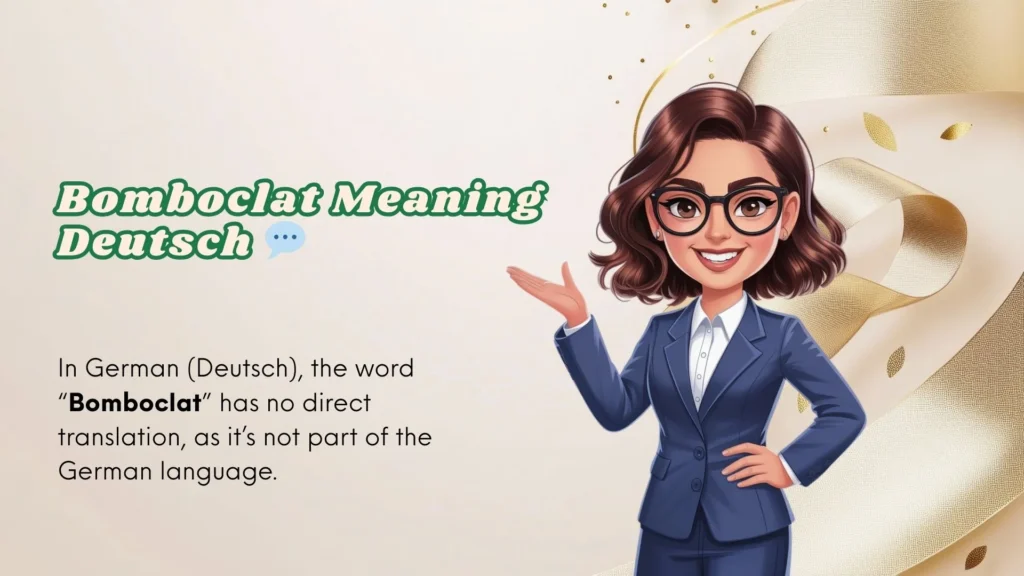
In German (Deutsch), the word “Bomboclat” has no direct translation, as it’s not part of the German language.
However, German speakers familiar with Caribbean culture or English slang might recognize it from:
- Music lyrics
- Social media memes
- International slang exposure
If translated for meaning, “Bomboclat” in German would correspond to vulgar expressions like:
- “Verdammt nochmal!” (Damn it!)
- “Was zur Hölle?” (What the hell?)
Still, its literal and cultural meaning remains uniquely Jamaican, and German speakers typically use it in internet meme contexts rather than traditional conversation.
Jamaica Bomboclat Meaning
In Jamaica, “Bomboclat” is one of the most offensive swear words in the local dialect, Jamaican Patois. It is used to express:
- Intense anger or frustration
- Surprise or disbelief
- Or as a strong insult in arguments
The word has a vulgar origin, referring historically to a menstrual cloth or toilet rag, making it deeply taboo.
In Jamaican culture, using “bomboclat” casually is often seen as highly disrespectful, and it’s generally avoided in formal or public conversations.
Jamaican Word Bomboclat Meaning
The Jamaican word “Bomboclat” (or bumboclaat) originates from the combination of two Patois terms:
- “Bumbo” – referring to the rear or bottom
- “Claat” – a slang version of “cloth”
Together, it literally means “butt cloth” or “sanitary rag.”
Despite the literal meaning, it’s used much like a curse word — similar to English expletives like “damn” or worse, depending on the situation.
Its use reflects the emotional intensity of the speaker and is often heard in Jamaican music, street talk, and heated moments.
Bomboclat Meaning Bad Word
Yes, “Bomboclat” is absolutely considered a bad word — specifically, a highly offensive curse in Jamaican Patois.
It’s equivalent in intensity to some of the strongest profanities in English.
It can be used:
- As a standalone insult: “You bomboclat!”
- To express rage: “Bomboclat, I can’t believe this happened!”
Because of its vulgar origin and heavy tone, it’s seen as very disrespectful when used inappropriately, especially by people unfamiliar with Jamaican culture.
Bomboclat Meaning in Spanish
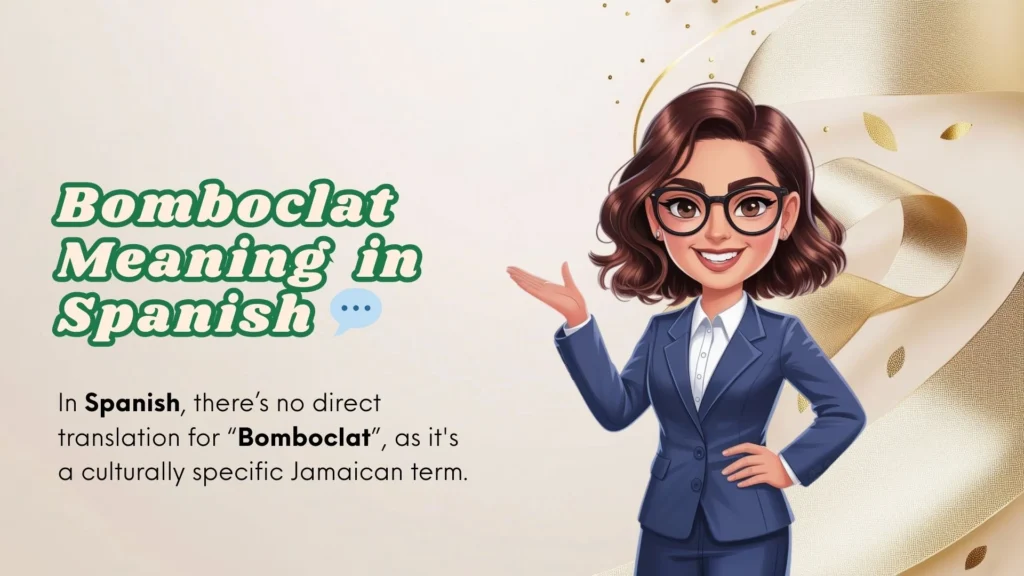
In Spanish, there’s no direct translation for “Bomboclat”, as it’s a culturally specific Jamaican term.
However, Spanish speakers often interpret it based on its tone and context.
Depending on the situation, it can be roughly understood as:
- “¡Maldita sea!” (Damn it!)
- “¿Qué demonios?” (What the hell?)
- Or just as an aggressive insult.
It’s important to note that while Spanish speakers may adopt the word in memes or music, many don’t fully understand its vulgar Jamaican roots.
Bomboclat Meaning en Español
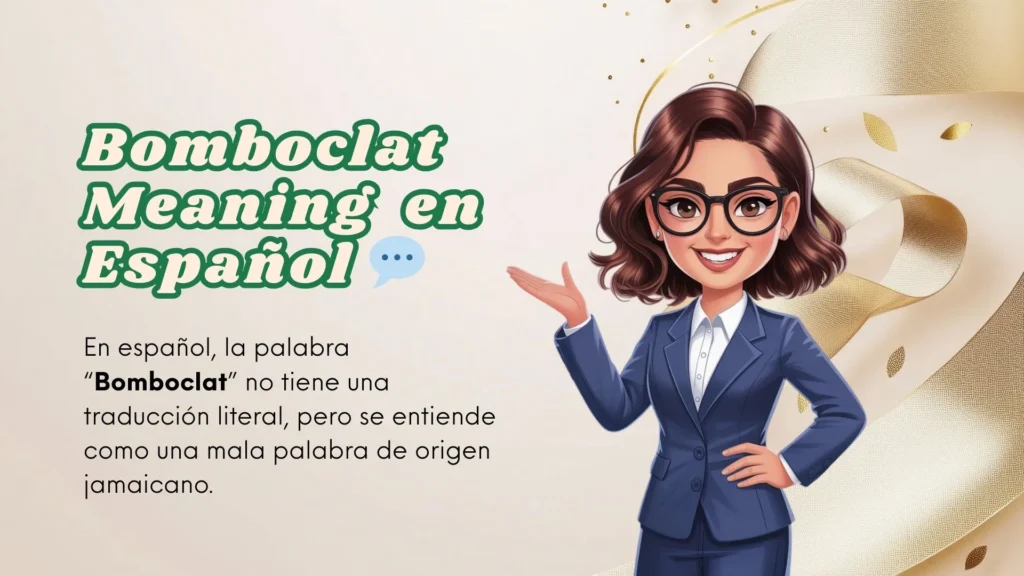
En español, la palabra “Bomboclat” no tiene una traducción literal, pero se entiende como una mala palabra de origen jamaicano.
Es común en canciones de reggae o dancehall, y en redes sociales como parte de memes.
En contextos informales, se interpreta como:
- “¡Maldita sea!”
- “¡Qué carajos!”
- “¡Qué demonios!”
Sin embargo, en la cultura jamaicana, “bomboclat” es considerada una de las peores groserías, por lo que su uso fuera de contexto puede ser ofensivo si no se entiende su verdadero significado cultural.
Background | Where “Bomboclat” Comes From
The bomboclat meaning cannot be fully appreciated without a look at its cultural and linguistic history.
The term is part of Jamaican Patois, an English-based creole language spoken primarily in Jamaica.
These dialects are rich in expressive and emotive vocabulary—many of which have deep historical and colonial roots.
Historical Roots:
- The term has been used for generations in Jamaica.
- It’s linked to expressions of rage, offense, or exasperation, similar to swearing in Western cultures.
- Jamaican patois terms like bomboclat, rasclaat, and bloodclaat were often expressions of frustration stemming from socio-economic conditions or colonial-era struggles.
As Jamaican music (especially reggae and dancehall) gained global traction, so did some of its language.
Artists like Bob Marley and Vybz Kartel used these expressions in songs, helping the words travel far beyond the island.
But it wasn’t until 2019, when “bomboclat” became a meme on Twitter, that the term gained massive popularity across digital platforms.
Usage in Different Contexts (Chat, Social Media, Professional Fields)
1. Chat & Casual Conversations:
In chat threads, “bomboclat” can appear as:
- An expression of disbelief: “Bomboclat! You actually did that?”
- A reaction to drama or gossip: “She said what?! Bomboclat.”
2. Social Media:
- Twitter & Instagram: Used as a meme caption or a standalone reaction to a viral photo or story.
- TikTok: Often featured in skits where characters express exaggerated frustration or surprise.
3. Professional Settings:
Rarely used in formal or professional environments.
In fact, it’s considered inappropriate in workplace communication due to its vulgar roots.
However, it might appear in creative industries like music or advertising to evoke a rebellious or edgy tone.
In all cases, context matters greatly.
Using it casually in the wrong setting can come across as offensive or culturally insensitive.
Meaning in Chat, WhatsApp, Instagram, TikTok
Let’s break it down platform by platform:
- Chat/WhatsApp: Typically used between close friends to joke or react with mock outrage. Example:
- “I just ate your last slice of pizza.”
- “Bomboclat! You serious?”
- Instagram: Appears under meme pages or dramatic images. Often used to invite captions or add comedic flair.
- Post: A funny image with no caption.
- Comment: “Bomboclat. Caption this.”
- TikTok: Common in skits where users recreate intense scenarios. For example:
- Someone finds their ex at a party with a new partner.
- Their reaction: “Bomboclat!”
Each platform adds its own flavor to the term, but the common theme remains: high emotion, often humorous.
Meaning in Physics, Medical, and Aircraft Terminology
Interestingly, bomboclat has no legitimate meaning in technical fields like:
- Physics
- Medicine
- Aviation
If used in these areas, it’s likely meant as a joke or expressive outburst by someone reacting to a surprising fact or event.
For example:
- A doctor sees an impossible diagnosis and says, “Bomboclat, that’s rare!”
- An engineer frustrated by a malfunction might exclaim, “Bomboclat, not again!”
These uses are entirely informal and should not be mistaken for actual technical jargon.
Common Misconceptions
Many people misinterpret bomboclat due to its viral use online. Here are a few myths:
- It’s just a meme word: Not true. Its origin is deeply cultural and offensive if misused.
- It means “caption this”: While it has been used that way on social media, that is not its actual meaning.
- It’s always funny or harmless: In Jamaica, it remains a strong curse word and is not used lightly.
These misunderstandings stem from cultural detachment and meme-driven usage that strips away context.
Similar Terms & Alternatives
If you want to express similar emotion without the cultural weight, consider these alternatives:
- OMG / WTH – for surprise or disbelief
- Bruh – for casual frustration
- Sheesh – to show exaggerated shock
- Yo! – expressive but neutral
- No way! – disbelief without offense
From Jamaican Patois, similar expressions include:
- Rasclaat
- Bloodclaat
⚠️ Be cautious: these too carry offensive weight in their original context.
How to Respond to It
If someone uses bomboclat in a message or meme, your response should depend on intent:
- Casual or meme use: Respond playfully.
- Example:
- Friend: “Bomboclat! Look at this outfit.”
- You: “That’s fashion on fire 🔥 lol.”
- Example:
- Serious or offensive tone: Either disengage or ask them to clarify.
- Example:
- Stranger: “You’re a bomboclat.”
- You: “Not cool. Let’s keep it respectful.”
- Example:
Context is key—if unsure, it’s safer to avoid responding in kind.
Differences from Similar Words
| Word | Origin | Use Case | Tone |
|---|---|---|---|
| Bomboclat | Jamaican Patois | Meme, Anger, Shock | Vulgar |
| Rasclaat | Jamaican Patois | Swear word | Very Vulgar |
| Sheesh | Internet Slang | Shock/Admiration | Mild |
| Bruh | Urban Slang | Disbelief/Annoyed | Neutral |
This comparison shows that while these terms may feel interchangeable online, only some are safe for all audiences.
Relevance in Online Conversations & Dating Apps
In dating apps and social chats, users often throw around trendy or meme-driven terms like bomboclat to appear funny or culturally aware. For example:
- Profile Bio: “Swipe right or bomboclat yourself 😂”
- Flirty Message: “You ghosted me? Bomboclat!”
Such usage is often playful but risks being misunderstood, especially by those unfamiliar with Caribbean culture.
It’s best to use such terms sparingly and with awareness of your audience.
Conclusion | Using “Bomboclat” Responsibly & Creatively
Bomboclat is more than just another slang term—it’s a powerful cultural expression with deep roots and modern-day impact.
Whether you’re seeing it in memes or casual chats, understanding its origin, tone, and proper usage is essential.
While it may add drama or flair to digital conversations, it’s also a reminder of how language can evolve and be repurposed across cultures.
When used thoughtfully and respectfully, Bomboclat can enhance your online persona.
But when misused, it can alienate or offend.
So, whether you’re scrolling through TikTok, chatting on WhatsApp, or swiping on a dating app, keep its meaning in mind—and choose your words wisely.

Staphine Cross is a passionate American author known for weaving emotion, resilience, and raw honesty into every story she tells. With a deep love for literature and human psychology, her writing captures the complexity of life, relationships, and personal transformation.
Born and raised in Seattle, Washington, Staphine pursued her studies in Creative Writing and Sociology, blending both disciplines to create stories that touch the heart and challenge the mind. Whether it’s fiction that dives into inner battles or essays that question societal norms, her voice stands out as authentic, bold, and beautifully crafted.
Beyond the page, she is a fierce advocate for mental health awareness and women’s empowerment, often speaking at writing workshops and literary events across the U.S. When she’s not writing, Staphine enjoys quiet evenings with her journal, herbal tea, and a bookshelf full of classics.
Her popular works include:
-
“Beneath Quiet Skies” – a reflective novel about healing and second chances.
-
“Letters I Never Sent” – a heartfelt collection of emotional essays.
-
“The Echo Between Us” – a gripping story of love, loss, and rediscovery.

